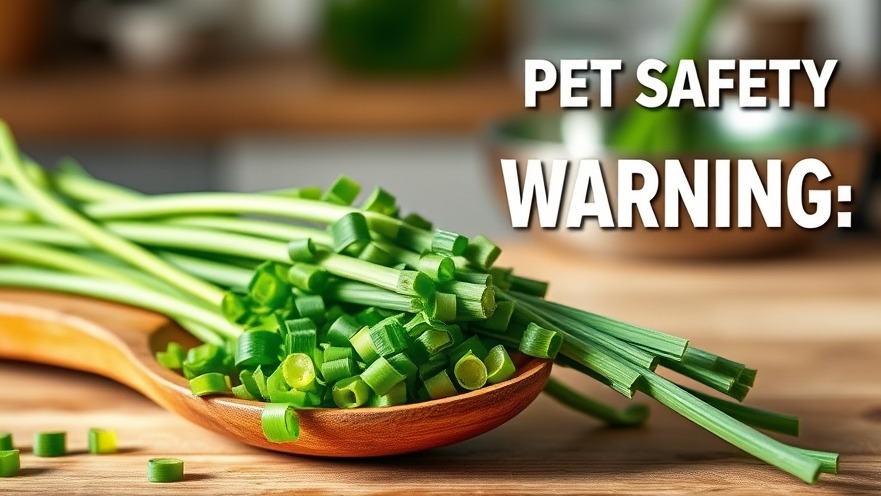
Why Chives Can Be Dangerous for Your Pets
As a dog owner, you probably care deeply about your furry friend’s well-being. While chives may be a popular garnish in kitchens around the world, they hold dangers that pet owners should never ignore. Chives (Allium schoenoprasum) belong to the allium family, which includes onions, garlic, and leeks. The compounds in these vegetables, specifically thiosulfates and disulfides, can lead to life-threatening health issues in pets.
Understanding the Risks: What Compounds Make Chives Toxic?
The dangers of chives stem from their toxicity, which affects our pets similarly to onions. Ingestion can lead to Heinz body hemolytic anemia, which is characterized by the breakdown of red blood cells. This condition arises when the toxic compounds interfere with an important enzyme in your pet’s body, leading to symptoms like weakness, jaundice, and gastrointestinal upset. Understanding how these compounds work can illuminate the severity of the issue and the need for vigilance among pet owners.
Signs of Chives Toxicity to Watch For
Recognizing the symptoms of chives toxicity early on is critical. Dogs may exhibit signs such as:
Weakness and lethargy
Gastrointestinal upset, including vomiting and diarrhea
Pale mucous membranes, indicative of anemia
Jaundice – a yellowing of the skin or eyes
Difficulty getting up, known as recumbency
These symptoms may manifest several days after ingestion, making it crucial for pet owners to remain vigilant and proactive in seeking veterinary care.
Prevention: Safe Storage and Handling of Chives
If you grow chives in your home or enjoy them frequently in meals, it’s vital to store them securely out of reach of your pets. Teach your furry friends to avoid certain areas of your kitchen where food is prepared or stored. By elevating your storage, you create a safer environment for your pets and help mitigate the risk of accidental ingestion.
What If My Pet Accidentally Eats Chives?
The well-being of your pet is paramount. If you suspect your dog has eaten chives, don’t wait for visible symptoms. Contact your veterinarian immediately! They may recommend an examination or possibly induce vomiting if the consumption was recent. Prompt action could save your pet from severe health ramifications.
Healthy Alternatives to Chives for Flavoring Pet Food
While some herbs are unsuitable for pets, there are many safe alternatives to enhance their meals. Consider herbs such as parsley or basil, which are non-toxic and can provide additional health benefits. Always consult your veterinarian about any new ingredients to ensure the safety and health of your canine companion.
Takeaway for Dog Owners
Being a responsible pet owner involves knowing which foods are safe and which are harmful. Avoid chives and other alliums in your pet’s diet. By taking the time to understand the hazards and monitor what your pets consume, you foster a healthier and safer environment for your beloved companions. Keeping your home and kitchen clear of dangerous foods is a small step that can yield significant health benefits for your furry family members.
Stay informed about pet safety and health by subscribing to our newsletter for more expert advice, tips, and community stories to keep your dog happy and healthy!
 Add Row
Add Row  Add
Add 




Write A Comment